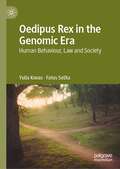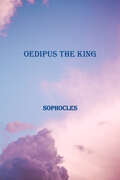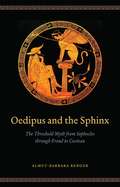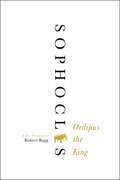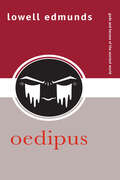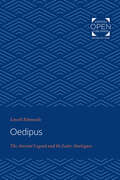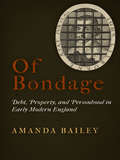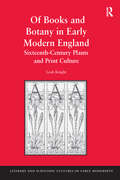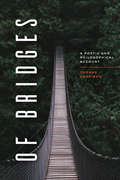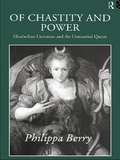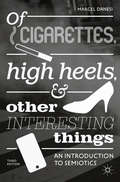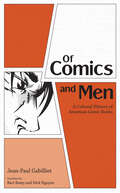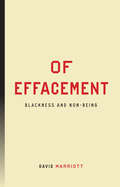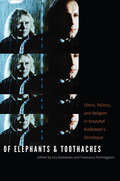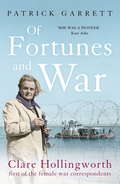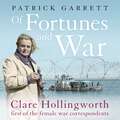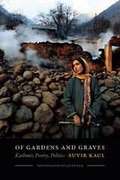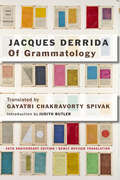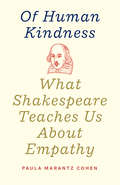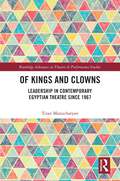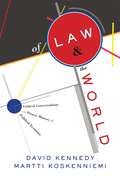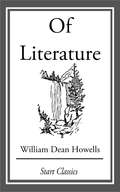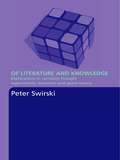- Table View
- List View
Oedipus Rex in the Genomic Era: Human Behaviour, Law and Society
by Yulia Kovas Fatos SelitaThis book explores the answers to fundamental questions about the human mind and human behaviour with the help of two ancient texts. The first is Oedipus Rex (Oedipus Tyrannus) by Sophocles, written in the 5th century BCE. The second is human DNA, with its origins around 4 billion years ago, and continuously revised by chance and evolution. With Sophocles as a guide, the authors take a journey into the Genomic era, an age marked by ever-expanding insights into the human genome. Over the course of this journey, the book explores themes of free will, fate, and chance; prediction, misinterpretation, and the burden that comes with knowledge of the future; self-fulfilling and self-defeating prophecies; the forces that contribute to similarities and differences among people; roots and lineage; and the judgement of oneself and others.Using Oedipus Rex as its lens, this novel work provides an engaging overview of behavioural genetics that demonstrates its relevance across the humanities and the social and life sciences. It will appeal in particular to students and scholars of genetics, education, psychology, sociology, and law.
Oedipus The King: A New Translation
by SophoclesAmong the most celebrated plays of ancient Athens, Oedipus the King is one of seven surviving dramas by the great Greek playwright, Sophocles, now available from Harper Perennial in a vivid and dynamic new translation by award-winning poet Robert Bagg. Oedipus the King is the ancient world’s most shocking and memorable tragedy; the story of Thebes’s resilient hero and his royal family brought to hellish ruin by fate, manipulation of the Olympian gods, and all-too-human weakness. This is Sophocles, vibrant and alive, for a new generation.
Oedipus and the Sphinx: The Threshold Myth from Sophocles through Freud to Cocteau
by Almut-Barbara RengerWhen Oedipus met the Sphinx on the road to Thebes, he did more than answer a riddle—he spawned a myth that, told and retold, would become one of Western culture’s central narratives about self-understanding. Identifying the story as a threshold myth—in which the hero crosses over into an unknown and dangerous realm where rules and limits are not known—Oedipus and the Sphinx offers a fresh account of this mythic encounter and how it deals with the concepts of liminality and otherness. Almut-Barbara Renger assesses the story’s meanings and functions in classical antiquity—from its presence in ancient vase painting to its absence in Sophocles’s tragedy—before arriving at two of its major reworkings in European modernity: the psychoanalytic theory of Sigmund Freud and the poetics of Jean Cocteau. Through her readings, she highlights the ambiguous status of the Sphinx and reveals Oedipus himself to be a liminal creature, providing key insights into Sophocles’s portrayal and establishing a theoretical framework that organizes evaluations of the myth’s reception in the twentieth century. Revealing the narrative of Oedipus and the Sphinx to be the very paradigm of a key transition experienced by all of humankind, Renger situates myth between the competing claims of science and art in an engagement that has important implications for current debates in literary studies, psychoanalytic theory, cultural history, and aesthetics.
Oedipus the King: A New Translation
by SophoclesAward–winning poet Robert Bagg presents a dynamic translation of Sophocles&’s celebrated play of ancient Athens, Oedipus the King. Praised by Aristotle as the pinnacle of Greek drama, Oedipus the King is one of seven surviving dramas by the great Greek playwright, Sophocles. The ancient world&’s most shocking and memorable tragedy, it is the story of Thebes&’s resilient hero and his royal family brought to hellish ruin by fate, manipulation of the Olympian gods, and all-too-human weakness.
Oedipus: A Folklore Casebook (Gods and Heroes of the Ancient World)
by Lowell EdmundsAn indispensable guide to the myth of Oedipus this book is the first to analyze its long and varied history from ancient times to the modern day, and presented with an authoritative survey that considers Oedipus in art and music as well as in literature. Lowell Edmunds accepts this variation as the driving force in its longevity and popularity. Refraining from seeking for an original form of the myth, Edmunds relates the changes in content in the myth to changes in meaning, eschewing the notion that one particular version can be set as standard.
Oedipus: The Ancient Legend and Its Later Analogues (Gods And Heroes Of The Ancient World Ser.)
by Lowell EdmundsDrawing on more than seventy works that dispersed the Oedipus legend from Greece to Asia, Africa, and the Americas, Edmunds provides a foundation for discussion of the lasting appeal of this legend, for claims of its universality, and for its uses as a vehicle for personal and cultural expression.The power of the Oedipus legend is apparent not only in its interpretations but even more so in its variations. As Edmunds writes, "Translations, adaptations, and performances still come forth in a never-ending stream. Again and again, playwrights have tried their hand at new shapings of the Sophoclean Oedipuses and often a country's Oedipus forms a whole chapter in the history of its literature." Drawing on more than seventy works that dispersed the Oedipus legend from Greece to Asia, Africa, and the Americas, Edmunds provides a foundation for discussion of the lasting appeal of this legend, for claims of its universality, and for its uses as a vehicle for personal and cultural expression.
Of Bondage
by Amanda BaileyThe late sixteenth-century penal debt bond, which allowed an unsatisfied creditor to seize the body of his debtor, set in motion a series of precedents that would shape the legal, philosophical, and moral issue of property-in-person in England and America for centuries. Focusing on this historical juncture at which debt litigation was not merely an aspect of society but seemed to engulf it completely, Of Bondage examines a culture that understood money and the body of the borrower as comparable forms of property that impinged on one another at the moment of default.Amanda Bailey shows that the early modern theater, itself dependent on debt bonds, was well positioned to stage the complex ethical issues raised by a system of forfeiture that registered as a bodily event. While plays about debt like The Merchant of Venice and The Custom of the Country did not use the language of political philosophy, they were artistically and financially invested in exploring freedom as a function of possession. By revealing dramatic literature's heretofore unacknowledged contribution to the developing narrative of possessed persons, Amanda Bailey not only deepens our understanding of creditor-debtor relations in the period but also sheds new light on the conceptual conditions for the institutions of indentured servitude and African slavery. Of Bondage is vital not only for students and scholars of English literature but also for those interested in British and colonial legal history, the history of human rights, and the sociology of economics.
Of Books and Botany in Early Modern England: Sixteenth-Century Plants and Print Culture (Literary and Scientific Cultures of Early Modernity)
by Leah KnightContemplating the textual gardens, poetic garlands, and epigrammatic groves which dot the landscape of early modern English print, Leah Knight exposes and analyzes the close configuration of plants and writing in the period. She argues that the early modern cultures and cultivation of plants and books depended on each other in historically specific and novel ways that yielded a profusion of linguistic, conceptual, metaphorical, and material intersections. Examining both poetic and botanical texts, as well as the poetics of botanical texts, this study focuses on the two outstanding English botanical writers of the sixteenth century, William Turner and John Gerard, to suggest the unexpected historical relationship between literature and science in the early modern genre of the herbal. In-depth readings of their work are situated amid chapters that establish the broader context for the interpenetration of plants and writing in the period's cultural practices in order to illuminate a complex interplay between materials and discourses rarely considered in tandem today.
Of Bridges: A Poetic and Philosophical Account
by Thomas Harrison“Always,” wrote Philip Larkin, “it is by bridges that we live.” Bridges represent our aspirations to connect, to soar across divides. And it is the unfinished business of these aspirations that makes bridges such stirring sights, especially when they are marvels of ingenuity. A rich compendium of myths, superstitions, literary and ideological figurations, as well as architectural and musical illustrations, Of Bridges organizes a poetic and philosophical history of bridges into nine thematic clusters. Leaping in lucid prose between seemingly unrelated times and places, Thomas Harrison gives a panoramic account of the diverse meanings and valences of human bridges, questioning why they are built and where they lead. He investigates bridges as flashpoints in war and the mega-bridges of our globalized world. He probes links forged by religion between life’s transience and eternity and the consolidating ties of music, illustrated in a case study of the blues. He illuminates the real and symbolic crossings facing migrants each day and the affective connections that make persons and societies cohere. In fine and intricate readings of literature, philosophy, art, and geography, Harrison engages in a profound reflection on how bridges form and transform cultural communities. Interdisciplinary and deeply lyrical, Of Bridges is a mesmerizing, vertiginous tale of bridges both visible and invisible, both lived and imagined.
Of Bridges: A Poetic and Philosophical Account
by Thomas Harrison“Always,” wrote Philip Larkin, “it is by bridges that we live.” Bridges represent our aspirations to connect, to soar across divides. And it is the unfinished business of these aspirations that makes bridges such stirring sights, especially when they are marvels of ingenuity. A rich compendium of myths, superstitions, literary and ideological figurations, as well as architectural and musical illustrations, Of Bridges organizes a poetic and philosophical history of bridges into nine thematic clusters. Leaping in lucid prose between seemingly unrelated times and places, Thomas Harrison gives a panoramic account of the diverse meanings and valences of human bridges, questioning why they are built and where they lead. He investigates bridges as flashpoints in war and the mega-bridges of our globalized world. He probes links forged by religion between life’s transience and eternity and the consolidating ties of music, illustrated in a case study of the blues. He illuminates the real and symbolic crossings facing migrants each day and the affective connections that make persons and societies cohere. In fine and intricate readings of literature, philosophy, art, and geography, Harrison engages in a profound reflection on how bridges form and transform cultural communities. Interdisciplinary and deeply lyrical, Of Bridges is a mesmerizing, vertiginous tale of bridges both visible and invisible, both lived and imagined.
Of Chastity and Power: Elizabethan Literature and the Unmarried Queen
by Philippa BerryElizabeth I was one of the most powerful women rulers in European history. What can feminism reveal about the attitudes of her male subjects towards this enigmatic figure?Through readings of key Elizabethan texts by Lyly, Ralegh, Chapman, Shakespeare, and Spenser, Philippa Berry shows that while Elizabeth's combination of chastity with political and religious power was repeatedly idealized, it was also perceived as extremely disturbing. The figure of the unmarried queen implicitly challenged the masculine focus of Renaissance discourses of love, philosophy and absolutist political ideology.In her exploration of the potent combination of themes of sexuality and politics with classical myth and Neoplatonic mysticism, Berry offers a radical reassessment of the status of `woman' as a bearer of meaning within Renaissance literature and culture.
Of Cigarettes, High Heels, and Other Interesting Things: An Introduction To Semiotics (Semaphores And Signs Ser.)
by Marcel DanesiThis book deals with one the most interesting aspects of human life—the search for meaning. It discusses how the science of semiotics is equipped to provide insight on what meaning is and how we produce it. Why is it that certain people routinely put their survival at risk by smoking? Why is it that some women make locomotion difficult for themselves by donning high-heel footwear? Are there unconscious forces at work behind such strange behaviors? This book will attempt to answer such questions by claiming that these behaviors are meaningful in culture-specific ways. The discipline that studies such behaviors and their relation to meanings is called semiotics. Semiotics probes the human condition in its own peculiar way, by unraveling the meanings of signs, which motivate not only the wearing of high heel shoes, but also the construction of words and art forms. Now in its third edition, this landmark introduction to semiotics has been updated with a wealth of new content, focusing on the many developments in digital culture since the previous edition. With the addition of topics such as memes, Selfies, social media profiles, and even Mafia discourse, the new edition comprehensively covers new trends in culture while streamlining treatments of basic semiotics contents.
Of Comics and Men: A Cultural History of American Comic Books
by Jean-Paul GabillietOriginally published in France and long sought in English translation, Jean-Paul Gabilliet's Of Comics and Men: A Cultural History of American Comic Books documents the rise and development of the American comic book industry from the 1930s to the present. The book intertwines aesthetic issues and critical biographies with the concerns of production, distribution, and audience reception, making it one of the few interdisciplinary studies of the art form. A thorough introduction by translators and comics scholars Bart Beaty and Nick Nguyen brings the book up to date with explorations of the latest innovations, particularly the graphic novel. The book is organized into three sections: a concise history of the evolution of the comic book form in America; an overview of the distribution and consumption of American comic books, detailing specific controversies such as the creation of the Comics Code in the mid-1950s; and the problematic legitimization of the form that has occurred recently within the academy and in popular discourse. Viewing comic books from a variety of theoretical lenses, Gabilliet shows how seemingly disparate issues—creation, production, and reception—are in fact connected in ways that are not necessarily true of other art forms. Analyzing examples from a variety of genres, this book provides a thorough landmark overview of American comic books that sheds new light on this versatile art form.
Of Effacement: Blackness and Non-Being (Inventions: Black Philosophy, Politics, Aesthetics)
by David MarriottIn Of Effacement, David Marriott endeavors to demolish established opinion about what blackness is and reorient our understanding of what it is not in art, philosophy, autobiography, literary theory, political theory, and psychoanalysis. With the critical rigor and polemical bravura which he displayed in Whither Fanon? Marriott here considers the relationships between language, judgement and effacement, and shows how effacement has become the dominant force in anti-blackness. Both skeptically and emphatically, Marriott presents a series of radical philosophical engagements with Fanon's "is not" (n'est pas) and its "black" political truth. How does one speak—let alone represent—that which is without existence? Is blackness n'est pas because it has yet to be thought as blackness? And if so, when Fanon writes of blackness, that it is n'est pas (is not), where should one look to make sense of this n'est pas? Marriott anchors these questions by addressing the most fundamental perennial questions concerning the nature of freedom, resistance, mastery, life, and liberation, via a series of analyses of such key figures as Huey Newton, Nietzsche, Malcolm X, Edward Said, Georges Bataille, Stuart Hall, and Lacan. He thus develops the basis for a reading of blackness by recasting its effacement as an identity, while insisting on it as a fundamental question for philosophy.
Of Elephants and Toothaches: Ethics, Politics, and Religion in Krzysztof Kieslowski's 'Decalogue'
by Eva Badowska Francesca ParmeggianiThis collection is the first to offer a genuinely interdisciplinary approach to Krzysztof Kieślowski’s Decalogue, a ten-film cycle of modern tales that touch on the ethical dilemmas of the Ten Commandments. The cycle’s deft handling of moral ambiguity and inventive technique established Kieślowski as a major international director.Kieślowski once said, “Both the deep believer and the habitual skeptic experience toothaches in exactly the same way.” Of Elephants and Toothaches takes seriously the range of thought, from theological to skeptical, condensed in the cycle’s quite human tales. Bringing together scholars of film, philosophy, literature, and several religions, the volume ranges from individual responsibility, to religion in modernity, to familial bonds, to human desire and material greed. It explores Kieślowski’s cycle as it relentlessly solicits an ethical response that stimulates both inner disquiet and interpersonal dialogue.
Of Fortunes and War: Clare Hollingworth, first of the female war correspondents
by Patrick Garrett'The list of female war reporters is long and distinguished. But the great-grandmother of them all was Clare Hollingworth' Mail on Sunday 'She was a pioneer' Kate Adie OBE'Unputdownable' Alexander McCall Smith'One of the most unforgettable journalists I have ever met' Chris PattenONE OF THE INSPIRATIONS BEHIND THE NEW BBC DRAMA WORLD ON FIRE. Legendary pioneering journalist Clare Hollingworth died in Hong Kong aged 105 in January 2017 after an illustrious career spanning the great events of the 20th century. Clare was famous for getting 'the scoop of the century': the outbreak of the World War 2. From witnessing the first aerial bombings against England in the First World War, through Hitler's Blitzkrieg, Clare's résumé included desert war in North Africa, civil war in Greece, terrorism in Jerusalem, naming Philby as the Third Man, and guerrilla warfare in Vietnam and Borneo. She had an uncanny ability to make headlines throughout her century-long life. And although her style of journalism was very different from the 24-hour breaking rolling news we have today, the need for detailed eye-witness reporting seems even more important today as we face an onslaught of fake news and alternative facts. The story is not just about news and war however: through access to family papers and personal accounts, her great-nephew Patrick Garrett is able to show Clare in three dimensions, explain her life and loves, and show how she dealt with the pressures of life as a correspondent - decades before women were routinely accepted in this role.facebook.com/celebrateclaretwitter.com/celebrateclare
Of Fortunes and War: Clare Hollingworth, first of the female war correspondents
by Patrick Garrett'The list of female war reporters is long and distinguished. But the great-grandmother of them all was Clare Hollingworth' Mail on Sunday 'She was a pioneer' Kate Adie OBE'Unputdownable' Alexander McCall Smith'One of the most unforgettable journalists I have ever met' Chris PattenONE OF THE INSPIRATIONS BEHIND THE NEW BBC DRAMA WORLD ON FIRE. Legendary pioneering journalist Clare Hollingworth died in Hong Kong aged 105 in January 2017 after an illustrious career spanning the great events of the 20th century. Clare was famous for getting 'the scoop of the century': the outbreak of the World War 2. From witnessing the first aerial bombings against England in the First World War, through Hitler's Blitzkrieg, Clare's résumé included desert war in North Africa, civil war in Greece, terrorism in Jerusalem, naming Philby as the Third Man, and guerrilla warfare in Vietnam and Borneo. She had an uncanny ability to make headlines throughout her century-long life. And although her style of journalism was very different from the 24-hour breaking rolling news we have today, the need for detailed eye-witness reporting seems even more important today as we face an onslaught of fake news and alternative facts. The story is not just about news and war however: through access to family papers and personal accounts, her great-nephew Patrick Garrett is able to show Clare in three dimensions, explain her life and loves, and show how she dealt with the pressures of life as a correspondent - decades before women were routinely accepted in this role.facebook.com/celebrateclaretwitter.com/celebrateclare
Of Fortunes and War: Clare Hollingworth, first of the female war correspondents
by Patrick Garrett'Unputdownable' Alexander McCall Smith'One of the most unforgettable journalists I have ever met' Chris Patten'She was a pioneer' Kate Adie OBEThe biography of acclaimed 20th century journalist Clare Hollingworth who scooped the outbreak of World War 2.After an illustrious career spanning the 20th century legendary journalist Clare Hollingworth died in Hong Kong aged 105 in January 2017. She was famous for getting 'the scoop of the century': the outbreak of the Second World War. From witnessing the first aerial bombings against England in the First World War, through Hitler's Blitzkrieg, Clare's résumé included desert war in North Africa, civil war in Greece, terrorism in Jerusalem, naming Philby as the Third Man, and guerrilla warfare in Vietnam and Borneo. She had an uncanny ability to make headlines throughout her century-long life. And although her style of journalism was very different from the 24-hour breaking rolling news we have today, the need for detailed eye-witness reporting seems even more important today as we face an onslaught of fake news and alternative facts. The story is not just about news and war however: through access to family papers and personal accounts, her great-nephew Patrick Garrett is able to show Clare in three dimensions, explain her life and loves, and show how she dealt with the pressures of life as a correspondent - decades before women were routinely accepted in this role.facebook.com/celebrateclaretwitter.com/celebrateclare(P)2017 John Murray Press
Of Gardens and Graves: Kashmir, Poetry, Politics
by Suvir Kaul Javed DarIn Of Gardens and Graves Suvir Kaul examines the disruption of everyday life in Kashmir in the years following the region's pervasive militarization in 1990. Kaul's autobiographical and analytical essays, which were prompted by his yearly visits to Kashmir, are a combination of political analysis, literary criticism, memoir, and journalistic observation. In them he explores Kashmir's pre- and post-Partition history, the effects of militarization, state repression, the suspension of civil rights on Kashmiris, and the challenge Kashmir represents to the practice of democracy in India. The volume also features translations of Kashmiri poetry written in these years of conflict. These poems constitute an archive of heightened feelings and desires that affectively interrogate official accounts of Kashmir while telling us much about those who face extraordinary political turbulence and violence. Of Gardens and Graves also contains a photo essay by Javed Dar, whose photographs work together with Kaul's essays and the poems to represent the interweaving of ordinary life, civic strife, and spectacular violence in Kashmir.
Of Grammatology
by Jacques DerridaThe deconstruction bombshell that rocked the Anglophone world.Jacques Derrida’s revolutionary approach to phenomenology, psychoanalysis, structuralism, linguistics, and indeed the entire European tradition of philosophy—called deconstruction—changed the face of criticism. It provoked a questioning of philosophy, literature, and the human sciences that these disciplines would have previously considered improper. Forty years after Of Grammatology first appeared in English, Derrida still ignites controversy, thanks in part to Gayatri Chakravorty Spivak’s careful translation, which attempted to capture the richness and complexity of the original. This fortieth anniversary edition, where a mature Spivak retranslates with greater awareness of Derrida’s legacy, also includes a new afterword by her which supplements her influential original preface. Judith Butler has added an introduction. All references in the work have been updated. One of contemporary criticism’s most indispensable works, Of Grammatology is made even more accessible and usable by this new release.
Of Human Kindness: What Shakespeare Teaches Us About Empathy
by Paula Marantz CohenAn award-winning scholar and teacher explores how Shakespeare&’s greatest characters were built on a learned sense of empathy While exploring Shakespeare&’s plays with her students, Paula Marantz Cohen discovered that teaching and discussing his plays unlocked a surprising sense of compassion in the classroom. In this short and illuminating book, she shows how Shakespeare&’s genius lay with his ability to arouse empathy, even when his characters exist in alien contexts and behave in reprehensible ways. Cohen takes her readers through a selection of Shakespeare&’s most famous plays, including Hamlet, Othello, King Lear, and The Merchant of Venice, to demonstrate the ways in which Shakespeare thought deeply and clearly about how we treat &“the other.&” Cohen argues that only through close reading of Shakespeare can we fully appreciate his empathetic response to race, class, gender, and age. Wise, eloquent, and thoughtful, this book is a forceful argument for literature&’s power to champion what is best in us.
Of Kings and Clowns: Leadership in Contemporary Egyptian Theatre Since 1967 (Routledge Advances in Theatre & Performance Studies)
by Tiran ManucharyanThis book examines the transformations Egyptian theatre has undergone since 1967. Through detailed analyses of the plays, the book investigates the ways Egyptian theatre represents, formulates, and imagines political and cultural leadership and, by implication, enacts its own leadership. Alongside the work of established playwrights, such as Yusuf Idris, Abul-ʿEla El-Salamouny, Fathia El-ʿAssal and Lenin El-Ramly, it also discusses the input in theatre of a younger generation, reflecting the new transformations in Egyptian theatre following the 2011 revolution. Relating the theoretical underpinnings of its analyses to theoretical discussions by Egyptian playwrights, the book contributes to current English-language scholarship in theatre studies, by providing a discourse largely absent from it. Considering the growing sense in English-language academia on the need for research and education beyond the Western canon this book offers an important addition to the study resources. This book will interest both scholars and students who study the Arab world, and researchers and students with an interest in cultural studies, more specifically twentieth- and twenty-first-century theatre, and literature studies. The book’s specific focus on political theatre and its gender perspective make it also of interest to the fields of political and gender studies.
Of Law and the World: Critical Conversations on Power, History, and Political Economy
by David Kennedy Martti KoskenniemiA searching dialogue between two leading legal scholars exploring the place of law in global affairs.The modern world is legalized: legal language, institutions, and professionals are everywhere. But what is law’s power in global life? What does all this legality have to do with hegemony, with hierarchy and inequality, and with the diversity of human experience? What is its history and how does that history matter in world affairs? Above all, what does it mean to think “critically” about law and global affairs? In this poignant and iconoclastic book, two leading scholars take us to the heart of the matter, examining law’s relationship with history, power, and political economy.David Kennedy and Martti Koskenniemi have often inspired each other and are both considered “critical” voices in international law, but they have never explored their similarities and differences as deeply as they do here. Of Law and the World takes the form of a conversation, as the authors reflect on the study of international law, the motivations underlying their research, and the payoffs and limitations of their investigations into law’s role in global affairs. They revisit and renew debates about the past and future of the many legalities that shape our world.Erudite, open-minded, and informed by decades of experience and observation, Of Law and the World is an unflinchingly honest confrontation with humanity’s struggle to live together.
Of Literature
by William Dean HowellsWilliam Dean Howells (1837-1920) was an American realist author and literary critic. He wrote his first novel, Their Wedding Journey, in 1871, but his literary reputation really took off with the realist novel A Modern Instance, published in 1882, which describes the decay of a marriage. His 1885 novel The Rise of Silas Lapham is perhaps his best known, describing the rise and fall of an American entrepreneur in the paint business. His social views were also strongly reflected in the novels Annie Kilburn (1888) and A Hazard of New Fortunes (1890). While known primarily as a novelist, his short story "Editha" (1905) - included in the collection Between the Dark and the Daylight (1907) - appears in many anthologies of American literature. Howells also wrote plays, criticism, and essays about contemporary literary figures such as Ibsen, Zola, Verga, and, especially, Tolstoy, which helped establish their reputations in the United States. He also wrote critically in support of many American writers. It is perhaps in this role that he had his greatest influence.
Of Literature and Knowledge: Explorations in Narrative Thought Experiments, Evolution and Game Theory
by Peter Swirski"Of Literature and Knowledge looks ... like an important advance in this new and very important subject... literature is about to become even more interesting." – Edward O. Wilson, Pellegrino University Professor, Harvard University. Framed by the theory of evolution, this colourful and engaging volume presents a new understanding of the mechanisms by which we transfer information from narrative make-believe to real life. Ranging across game theory and philosophy of science, as well as poetics and aesthetics, Peter Swirski explains how literary fictions perform as a systematic tool of enquiry, driven by thought experiments. Crucially, he argues for a continuum between the cognitive tools employed by scientists, philosophers and scholars or writers of fiction. The result is a provocative study of our talent and propensity for creating imaginary worlds, different from the world we know yet invaluable to our understanding of it. Of Literature and Knowledge is a noteworthy challenge to contemporary critical theory, arguing that by bridging the gap between literature and science we might not only reinvigorate literary studies but, above all, further our understanding of literature.
